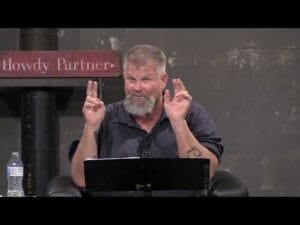
Luke 8:1-18 Bible Teaching
Shawn's teaching on Luke 8:1-18 highlights Jesus' use of parables, the role of women in His ministry, spiritual truths, and the internal nature of God's Kingdom.

Shawn's teaching on Luke 8:1-18 highlights Jesus' use of parables, the role of women in His ministry, spiritual truths, and the internal nature of God's Kingdom.

Teaching emphasizes God's power to transform believers, spiritual rebirth through grace, overcoming sin, and unification of Jews and Gentiles in Christ.

The teaching contrasts a repentant sinner's love and faith with a Pharisee's judgment, emphasizing forgiveness, gratitude, and the heart's attitude in seeking reconciliation with God.

Paul teaches that God's power raised Christ, placing Him above all authority as head of the church. This power also transforms believers, granting them wisdom and new life.

Paul's teaching in Ephesians 1:15-23 highlights gratitude for Gentile faith, prays for spiritual wisdom, emphasizes Christ's power, unity in the church, and transformative grace.

Jesus affirms His messianic identity through miracles and preaching, praises John the Baptist, emphasizes spiritual rebirth, and critiques religious leaders' hypocrisy.

Jesus teaches that actions reveal the heart's true nature, like trees by their fruit. Genuine faith requires action, not just words. A strong foundation in Christ ensures resilience.

Shawn's teaching on Ephesians 1 focuses on predestination for Israel, redemption through Christ, unity of Jews and Gentiles, rejection of Calvinism/Arminianism, and Holy Spirit sealing.

Jesus and Shawn teach prioritizing spiritual values over wealth, love for enemies, agape love, mercy, forgiveness, self-reflection, and generosity for divine rewards.

The teaching examines Ephesians 1:1-11, focusing on God's overarching purpose rather than individual predestination, highlighting unity of Jews and Gentiles in Christ.

Jesus chose 12 apostles after prayer, highlighting commitment and sacrifice. Teachings in Luke and Matthew differ contextually, emphasizing eternal over temporal values.

Shawn critiques Reformed Theology, emphasizing spiritual blessings over material gains, challenges Total Depravity, Limited Atonement, Irresistible Grace, and Perseverance of Saints, and warns against elitism in election.

Jesus asserts His authority over the Sabbath, prioritizing mercy over legalism. He emphasizes compassion, healing, and divine guidance, challenging traditional views.

The Epistle to the Ephesians, attributed to Paul, addresses both Ephesus and broader audiences, emphasizing unity in Christ, spiritual inheritance, and predestination.

Paul's letter to the Galatians stresses faith in Christ over the Law, criticizing circumcision for avoiding persecution. True transformation is through Christ's cross, not legalism.

Jesus calls sinners to repentance, challenges old traditions, emphasizes mercy over legalism, and highlights love and inclusivity, contrasting with religious leaders.

Paul teaches to restore sinners gently, emphasizing love and humility, bearing burdens, personal responsibility, and sowing to the Spirit for eternal life.

Shawn's teaching on Luke 5:17-26 highlights Jesus' authority to forgive sins and heal, emphasizing faith, determination, and the transformative power of spiritual healing.

Paul contrasts "works of the flesh" with "fruit of the Spirit" like love, joy, peace, emphasizing spiritual growth through the Holy Spirit, not human effort.

Jesus' teachings in Capernaum included miraculous fish catch, healing leprosy, and emphasizing faith. Peter's transformation to "fisher of men" highlights divine reliance.